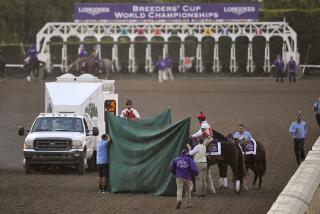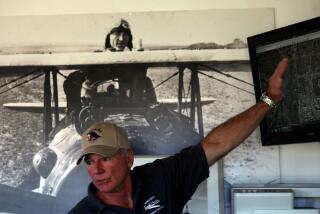‘Miracle’ Escape From Plane Crash by Jockeys in England
- Share via
Frankie Dettori, one of England’s premier jockeys, and another rider, Ray Cochrane, miraculously escaped from the wreckage of a twin-propellered plane that crashed and exploded Thursday only a mile from the Newmarket Race Course, northeast of London.
With Cochrane’s help, Dettori escaped from the baggage hole at the rear of the Piper Seneca that was to fly the two jockeys from Newmarket to the Goodwood course for an afternoon of racing. Cochrane returned to the plane to help the pilot--the only other person aboard--but flames drove him away. The pilot, not immediately identified, was pronounced dead at the scene.
Both Dettori, 29, and Cochrane, 41, were airlifted to a nearby hospital where they remained for observation and treatment. Dettori suffered a broken right ankle, a possible broken thumb and severe burns to his head and face. Cochrane suffered head burns and possible chest injuries.
“Frankie is pretty smashed up,” said Peter Burrell, Dettori’s business manager, who visited him at the hospital. “He has numerous cuts--cuts to his leg, his head and arms. He has numerous cuts to the head. They were finishing tests on Ray when I left. They are worried about him.”
Steve Brown, a Suffolk police inspector who is part of the team investigating the crash, looked at the debris of the plane and was astounded.
“It would certainly seem to be a miracle that anyone got out of it alive,” he said.
Peter Ludford of the Suffolk fire service also thought Dettori and Cochrane were extremely fortunate.
“It’s astonishing that anyone got out alive, let alone without major injuries,” Ludford said. “We are unaware of the fuel load that the aircraft was carrying, but clearly there was a disintegration of the [gas] tanks upon impact.”
The heroes were the dead pilot, who avoided a worse crash, and Cochrane, who came to Dettori’s aid.
“I’m very lucky to be here,” Dettori was quoted as saying from his hospital bed.
After talking to both jockeys, Burrell said: “They both cannot praise the pilot enough. If he had hit a dike, they would all have died.”
About 12:30 p.m., the American-built plane left the vacant Newmarket complex, where there was no racing Thursday. The plane never rose more than 300 feet off the ground. It swung around and crashed, pinwheeling across the ground between the track’s two racing courses.
“The plane was on fire and broken up,” said Nick Lees, the clerk of the Newmarket course and one of the first to arrive at the crash scene. “Both jockeys were conscious and huddled together, about 50 yards from the wreckage. There were a few small explosions.”
Because English racing is so fragmented--so-called race “meets” there frequently last only a day or two--horses are vanned from training centers to the tracks and jockeys must move, usually by car or plane, with them. For instance, Wednesday’s racing was at Newbury, Thursday’s was scheduled for Goodwood and today’s cards were at Bath and Brighton.
“[Flying] is a way of life for the jockeys,” said Willie Carson, the English rider who retired about five years ago to become a telecaster. “If you are using planes regularly, accidents will happen. Taking off in a twin-engined plane is more dangerous than a single engine, because if you lose an engine, the other engine pulls you into the ground.”
Carson said that when he rode, he averaged 80 to 100 hours of flying time per year. It is likely that a jockey in demand as much as Dettori would spend even more time in the air.
Gary Stevens, the American jockey who retired here late last year after riding in England last summer, said that one of the things he disliked about English racing was the short plane hops.
“You’d fly those single-engine or twin-engine jobs and they’d land you right in the infield of some of the tracks,” Stevens said. “Sometimes you wouldn’t clear the trees by much. You’d say to yourself that it would only be a matter of time before something happens.”
Thursday’s crash came a month after David Coulthard, the Formula One driver, was injured along with his fiancee and his trainer when his Learjet went down in Lyons, France, in a crash that killed the two pilots.
After his scheduled day of riding at Goodwood Thursday, Dettori had been scheduled to fly to Japan, where he had a mount in a stakes race on Sunday.
Dettori, the son of a top Italian jockey, is a showman besides being a talented rider. He’s known around the world for his flying dismounts in the winner’s circle after he has won a race. He won his first race in Italy in 1986, moved to England the next year and even spent a winter in California as he honed his skills. He was the English riding champion in 1994 and 1995, winning a total of 449 races, and in 1997 he swept the seven-race card at Ascot, costing British bookmakers an estimated $64 million in payoffs.
The Ulster-born Cochrane has won both the English and the Irish Derbies. Early in his career, as his weight fluctuated, Cochrane rode on both the jumps and the flats, moving to the steeplechasers when he got heavier. There was a time, before his budget allowed for charter planes, when Cochrane would ride his motorbike to get to the next race meet.
More to Read
Sign up for Essential California
The most important California stories and recommendations in your inbox every morning.
You may occasionally receive promotional content from the Los Angeles Times.










